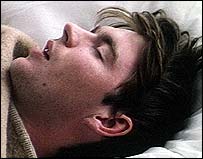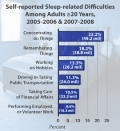Common Sleep Problems and the Implications for Men

The Center for Disease Control and The National Sleep Foundation have been watching you while you sleep. They feel that you need 7 to 9 hours of sleep each night or you will be at risk for disease, disability, and injury.
Of adults studied: 35%+ reported sleeping less than 7 hours, 48% admitted snoring, 40% fell asleep at least once daily, and almost 5% dozed off at the wheel while driving. Cross correlated for age, gender, and ethnicity, there were no marked differences between experience of men and women.
However, when it comes to matters of virility and cardiovascular disorders, men are at higher risk. Now, current studies have been limited; that is, depending on the accuracy or truth of self-disclosure, the studies are not fully or objectively sound. Nonetheless, the results are enough to make us look at the impact on the cost to workplace productivity, the risk to mortality and morbidity, and, at least, in the case of men, to an active sex life.
- Be aware that dozing off can be a sign of illness, dependency, or stress. It can be a symptom of numerous diseases and the outcome of some, such as hypertension or diabetes.
- And it can be dangerous. It can lead to falls, cuts, and other injuries.
- And costly; dozing off at work can cost employers and employees, especially when they affect the levels of accountability in jobs that require alert responsibility.
Sleepless or fitfully sleepless nights contribute to poor vigilance while driving. It complicates information processing and, thereby, slows reaction time, much as intoxication does.
But, what does this mean to men - specifically?
- Men who lose sleep are at a risk for lower testosterone levels. Asked to provide blood samples in the morning, men in their 80s had a high testosterone level than later in the day, suggesting that sleep restored their T-level. This assumes, of course, that 80 year old men sleep better and sounder than younger men, but studies indicate that they do. (This is apparently true of British men as well.)
- Another recent study indicates that 50% of men suffering from erectile dysfunction also suffer from Obstructive Sleep Apnea (OSA). It would appear that sleep apnea, in disturbing the respiratory system, also reduces oxygen to the system which is necessary to hormonal balance and the related sexual mechanics.
- Men who do not sleep soundly also are at higher risk for cardiovascular disease. Studies by experts at Penn State and Brown Universities measured a considerable thickening of the walls in the carotid artery of men with sleep disorders with no comparable increase in the women's arteries. The carotid is the location of many strokes, so these findings are worrisome.
- Insomnia refers to the difficulty of falling or staying asleep.
- Parasomnia refers to difficulty sleeping wrought by sleepwalking, night terrors, bedwetting, frequent urination, etc.
- Restless legs syndrome (RLS) describes a chronic nervous twitching and muscular cramping in the legs, usually felt just as you are falling asleep.
- Narcolepsy is a nervous system disorder that makes a patient fall asleep at inopportune times during a waking day.
- Sleep apnea refers to the stopping of breathing during sleep for up to 45 seconds at a time until the "sleeper" jolts back awake or into a breathing mode.
Common causes of sleep disorders
Sleep disorders, and there are others, appear to be caused by a number of factors, many of which overlap. This makes definitive diagnosis difficult and slow to come by.
- Diet: Eating after 9:00 PM means your systems are pre-occupied with digestion - not sleep - at the time you go to bed. Caffeine, tobacco, and alcohol stimulate adrenaline and alter biochemistry and respiration. (It takes 4 hours for just one cola to work itself out of your system.)
- Overwork: Working too hard, mentally or physically, can overtax your systems, so they are harder to restore. Shift work and extended shifts, in particular, show statistically negative effects. (Because shift workers are, more often than not, minority workers, they suffer disproportionately.)
- Stress: The body and the brain need time for restoration, so the effect of stress on sleep comes full circle; that is, stress may disturb your sleep pattern which, in turn, leads to more stress.
- Environment: Crying babies, noisy neighbors, snoring spouses, all can ruin your sleep.
- Disease: Chronic diseases, such as diabetes, hypertension, and chronic pain syndromes, can make sleep desirable during the day, only to rob you of sleep at night. Life threatening diseases like cancer carry their own stresses and fears as well as sleep disorder syndromes.
- Medications: The side-effects of some medications include vivid dreams, insomnia, or drowsiness.
- Obesity: Being overweight exacerbates problems, such as hypertension and diabetes, but the additional weight may present an obstruction to proper breathing cycles.
So, what are we to do?
The medical world needs more sleep trained practitioners (somnologists), professionals who can recognize symptoms and syndromes for what they are and afford early care and treatment. They need more and deeper objective research using actigraphy (a portable device that records sleep and wake patters) and polysomnography (software that measures and analyzes sleep patterns). Moreover, men - and women - need to change some habits to improve sleep behaviors, reduce disorder or disorder frequency, and reduce their risk of mortality and morbidity - not to mention improve their sex lives.
- Establish a regular bed time and stick to it. Make a ritual of getting prepared: for example, read a little or listen to soothing music (in another room), put out the cat, set a cool temperature, don your pajamas, etc.
- Avoid caffeine, alcohol, and foods after 9:00. If you can avoid anything after dinner, but if you must, make a custom of a cup of non-caffeinated tea.
- Prepare the bed with a firm mattress and a firm but flat pillow, so as not to raise your head, constricting or obstructing your breathing.
- Schedule medications that disturb your sleep for some other time of day - to the extent that you can.
- Avoid aerobic exercises before resting although low impact yoga or tai chi may be relaxing. Exercise regularly and actively but at some other time of the day.
- Lose weight if you are carrying too many pounds (more pounds than your size and body type support). Seek your doctor's advice on this and make sure s/he draws the connection between your weight and sleep disorder.
- Ask your General Practitioner to refer you to a neurologist or sleep study center. Abide by the results and recommendations which may suggest use of a sleep medication or a Continuous Positive Airway Pressure (CPAP) machine, an air pump that presses air through a face mask into the lungs of sleep apnea patients.
- Discuss homeopathic remedies with your doctor. Some recommend aids, such as melatonin or quinine.
Keep a journal of your nighttime and daytime behaviors, and review them in detail with your doctor to see what signs correlate with what causes. But, with over 20% of the population suffering from some such problem, you need to take sleep seriously.









